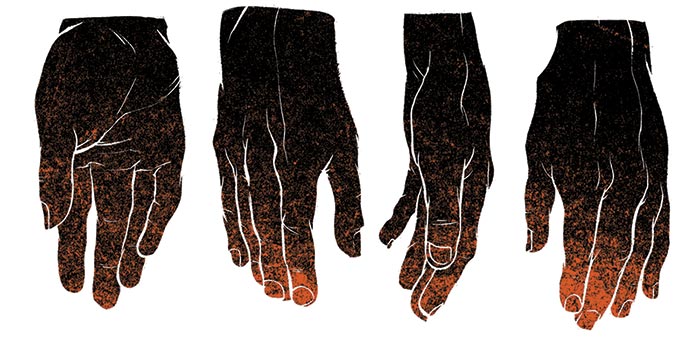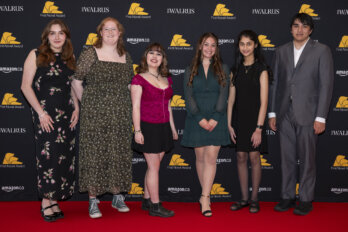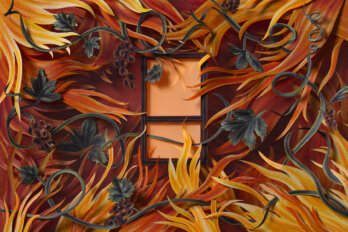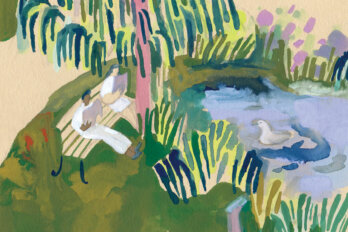May 1941. The corn is high.
There are two goatherds keeping watch over all the goats in Zostiko. A Greek and a Bulgarian. The Bulgarian is a big guy, enormous.
One day, some goat thieves come and grab two of the goats—but the Bulgarian sees them. So they run over and start pounding him with their clubs, grab him, drag him to the dere, to the gorge, over by the Black Cliffs. At Dalakas’s fir tree.
And they butcher him with pruning shears.
As soon as word gets out, the Bulgarians grab the Greek goatherd and bring him down to the kafeneio. They beat him, stretch him out on a white board, and carry him to the station for interrogation. Then an Armenian goes and tells them it was Greek antartes from the Resistance who killed the Bulgarian.
Antartes? Yes, antartes.
So the Bulgarian prefecture decides to kill all the Greek men in the village. And the male children. The young women, too.
The Bulgarian Army streams out, into the yards and streets and houses. They round everyone up, hitting and kicking. Some people they shoot right there on the spot. They come to our house, too. Three soldiers stand guard outside, with pistols. The others come in and grab my mother, my father, and my little brother.
When my mother starts to say something about the kid, they slap her across the face.
They tie my father up, because he was the village deputy.
Then they march them all down to the square.
The only ones left in the house are me and my grandmother. So we go to the upstairs window to watch.
Little by little they gather up all the men and young women and keep them standing there in the square.
That day it was really hot. Blistering. More like July than May. At the far side of the square, there are some fruit crates piled up in front of a low wall—I can still see them now. They push everyone into a big mass over by those crates.
Even the little boys.
Then they make everyone undress. They line them all up and make them turn around. Then they set up three machine guns on top of those crates. And then, at that very moment, believe it or not, the king of Bulgaria happens to ride right through the square. King Boris, the one the Germans poisoned a year or so later.
King Boris is touring through Macedonia and Thrace. He’s sick and has come to pray at our church, to the icon of Saint Marina, worker of miracles. He wants to make an offering.
As he’s passing through the square in his jeep, with his convoy trailing behind, he sees the people standing there, naked, all in a row. He sees the soldiers. The guns.
So he stops. He gets out of the jeep to see what is going on. The Bulgarian officers won’t tell him. So he asks again and again, until they tell him the whole story. Then he says, You’re going to kill all these people because one of our men died? A whole village for one goatherd?
And he says to them, sternly, Put those guns away. Enough is enough. Let these people get back to work.
Now I’m sitting here wondering what would’ve happened if the king had taken the lower road, the one that went by my brother’s house. What if he hadn’t seen what was happening in the square? Or what if he had come to leave his offering at the church a half hour later that afternoon?
Then it would have been just me and my grandmother and a few other little girls and old women in a town full of empty houses.
The Bulgarians would have killed them all, every one.
Just as they did in Kerdillia. And Doxato. Fifteen thousand in Drama. Ninety in Hrisoupoli. For giving guns to the Resistance fighters, and to Giovan Tsaous. That’s why I still believe that what happened that afternoon was a miracle. Saint Marina saved us.
All during the Occupation, at eight each morning, the church bell would ring and all the men would gather in the square.
The Bulgarians would come and take them for forced labour. Out in the fields, up in the mountains. Building roads and footbridges.
Whoever came late, they beat.
The overseer was a short guy with a heavy hand who looked like a salamander. He always carried a big pistol and sometimes he would fire it into the air. If someone came late, the overseer would slam the pistol down on his head. Or if someone dared to look him in the eye.
Even my father’s cousin, the giant, Pericles.
And what could Pericles do? He just sat there and took it. After all, if they were to kill him, what would become of his wife?
Once it’s rolled up and wrapped with cord, a bale of hay weighs thirty kilos. Before the Bulgarians came, Pericles could grab four of them at once, two in each hand, and toss them onto the bed of a truck as if they were as light as chicken feathers.
Sometimes for laughs the guy who owned the kafeneio would stick eight nails into a hard walnut tabletop, and Pericles would wrap a piece of cloth around his hand and hammer them in, down to the head, with a single blow of his open palm.
One day, three of his brothers-in-law were carrying four poplar trunks in a cart when the cart’s axle broke. The wheel just popped off and rolled away, and the cart ground to a halt.
The three men struggled to lift it with crowbars. Nothing. They tried again; nothing.
So finally they call Pericles. He shimmies under the cart, lifts it with a single hand, and says, Grab the wheel and stick it back on.
When Pericles got drunk, all of Zostiko went into hiding. He would say to his wife, I’m going to the kafeneio for a coffee.
She’d say, I’ll make you one myself.
No, I want to drink it there.
So he’d go to the kafeneio, sit down, and order a bottle of vodka and half a kilo of bread. He’d fill his water glass with vodka, dunk in some bread, and swallow it whole. Then he’d knock down the rest of the glass in a single swallow. Straight. After the first bottle he’d start to make a little trouble in the kafeneio.
After the second —which he always drank straight, no bread—he’d go wild. He’d go out into the street, get up on his horse, and start to ride through Zostiko, cursing at everyone. Men, old women, children, animals.
Everything bothered him, even the trees. If he saw anyone in the street, in a barn or garden or house, he’d start cursing at them, trying to scare them, and might even slide off his horse and try to catch them and beat them up. Just like that, for no reason.
Then again, he rarely saw anyone at such times—as soon as they heard he was down getting drunk at the kafeneio, the whole village would run and hide. They’d all run home and lock all the windows and doors until the binge was over.
So Pericles would ride like that for a few hours through the deserted village. No one dared to speak to him, much less try and stop him.
He didn’t want to see a soul.
The only one who could get him back under control was his wife, Balasi, a thin, nervous, slip of a woman. Half his size.
She would go out into the street as Pericles was riding up on his horse and stand there blocking his way, motionless, fearless, and say, Come on, boy, enough’s enough. Come on in now.
As soon as he saw her, Pericles would lower his head like a disciplined child, jump down from his horse, and slink inside as if he knew he’d done something very bad. Then he would lie down on the bed and curl up in a little ball of shame.
Only Balasi could control that giant. And she was no bigger than a teacup.
One night, Pericles was getting drunk in the kafeneio, drinking wine with some friends. After the first hour, the owner started watering the wine.
Pericles realized what was happening soon enough. So he called the owner over and said, Go get all the glasses you have and put them here on the table.
All?
All.
What could he do? The owner got together all the glasses and lined them up on the table.
Then Pericles started picking them up one by one and —drack!—breaking them against the corner of the table. Drack! Drack! Drack!
A hundred and forty-two glasses. He broke every one.
By then the owner was tearing his hair out with grief—the next day was a feast day and he was expecting lots of customers. He was practically foaming at the mouth, but he didn’t dare say a word.
The next time you water my wine, Pericles told him, I’ll smash the whole place to pieces. And you with it.
The owner started to cry.
That made Pericles feel sorry for him. So the next morning he woke up and went around to all the nearby villages, borrowing glasses from all the kafeneia. And by midday he brings them all to the kafeneio owner. He counts out exactly 142 glasses.
Take them, Pericles says, so the shop won’t be empty tonight.
Pericles died of Parkinson’s at the age of eighty-three. He died in the village, in Zostiko, in 1978.
He liked his drink, though, and drank all the way into old age.
He was bedridden for six months at the end. During the last few weeks he kept having hallucinations. He’d be curled up in bed, trembling with fear, talking deliriously.
He started calling vodka “oxygen.” And the donkey “helicopter.” Did you unload the helicopter? Did you tie up the helicopter? Because his donkey had huge ears that flicked around like propellers.
At the very end, Pericles cried all the time, hiding between the two mattresses on his bed. He kept raving to Balasi that there were dismembered hands hanging from the ceiling.
He said there were people slaughtering hens under his bed.
It’s a Monday morning in 1942. Hazy weather. Like the sun is scared to come out.
All the men are gathered in the square. The Bulgarians are taking them to work in a quarry near Xanthi. Pericles is a few minutes late. He stumbles into line with sleep still in his eyes, no coffee yet that morning. The Bulgarian overseer, that little salamander of a man, shaking with anger, starts hitting the giant Pericles over the head with his pistol. He has to jump up as high as he can in order to bring the gun down on Pericles’s skull. The dwarf hitting the giant.
He had the power, see? Because he had the gun.
And he does it practically every morning as the men are gathering in the square. He goes up to Pericles, jumps into the air, and brings the gun down on his head. Because Pericles was the strongest of all the men.
Pericles doesn’t move a muscle. He stands there completely still. Like his mind is somewhere else. He knows that if he lays a finger on the Bulgarian, that worm will shoot him.
It’s not that he’s scared. He plays the fool on purpose. He’s thinking of Balasi.
Of what would happen to his wife if he got killed.—translated from the Greek by Karen Emmerich






